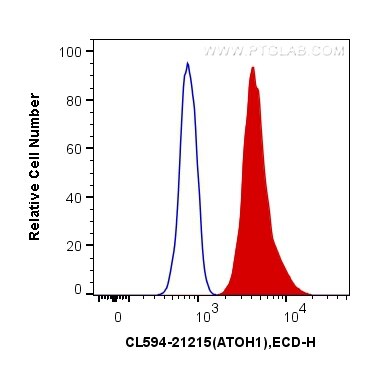Tested Applications
| Positive FC (Intra) detected in | HepG2 cells |
Recommended dilution
| Application | Dilution |
|---|---|
| Flow Cytometry (FC) (INTRA) | FC (INTRA) : 0.40 ug per 10^6 cells in a 100 µl suspension |
| It is recommended that this reagent should be titrated in each testing system to obtain optimal results. | |
| Sample-dependent, Check data in validation data gallery. | |
Product Information
CL594-21215 targets ATOH1 in FC (Intra) applications and shows reactivity with human, mouse, rat samples.
| Tested Reactivity | human, mouse, rat |
| Host / Isotype | Rabbit / IgG |
| Class | Polyclonal |
| Type | Antibody |
| Immunogen |
CatNo: Ag15615 Product name: Recombinant human ATOH1 protein Source: e coli.-derived, PGEX-4T Tag: GST Domain: 1-354 aa of BC069594 Sequence: MSRLLHAEEWAEVKELGDHHRQPQPHHLPQPPPPPQPPATLQAREHPVYPPELSLLDSTDPRAWLAPTLQGICTARAAQYLLHSPELGASEAAAPRDEVDGRGELVRRSSGGASSSKSPGPVKVREQLCKLKGGVVVDELGCSRQRAPSSKQVNGVQKQRRLAANARERRRMHGLNHAFDQLRNVIPSFNNDKKLSKYETLQMAQIYINALSELLQTPSGGEQPPPPPASCKSDHHHLRTAASYEGGAGNATAAGAQQASGGSQRPTPPGSCRTRFSAPASAGGYSVQLDALHFSTFEDSALTAMMAQKNLSPSLPGSILQPVQEENSKTSPRSHRSDGEFSPHSHYSDSDEAS Predict reactive species |
| Full Name | atonal homolog 1 (Drosophila) |
| Calculated Molecular Weight | 354 aa, 38 kDa |
| Observed Molecular Weight | 38-40 kDa |
| GenBank Accession Number | BC069594 |
| Gene Symbol | ATOH1 |
| Gene ID (NCBI) | 474 |
| RRID | AB_2919862 |
| Conjugate | CoraLite®594 Fluorescent Dye |
| Excitation/Emission Maxima Wavelengths | 588 nm / 604 nm |
| Form | Liquid |
| Purification Method | Antigen affinity purification |
| UNIPROT ID | Q92858 |
| Storage Buffer | PBS with 50% glycerol, 0.05% Proclin300, 0.5% BSA, pH 7.3. |
| Storage Conditions | Store at -20°C. Avoid exposure to light. Stable for one year after shipment. Aliquoting is unnecessary for -20oC storage. |
Background Information
ATOH1, also named as Protein atonal homolog 1 or BHLHA14, is a 364 amino acid protein, which contains 1 bHLH (basic helix-loop-helix) domain. ATOH1,as a transcriptional regulator in the nucleus activates E box-dependent transcription in collaboration with TCF3/E47, but the activity is completely antagonized by the negative regulator of neurogenesis HES1. ATOH1 plays a role in the differentiation of subsets of neural cells by activating E box-dependent transcription.
Protocols
| Product Specific Protocols | |
|---|---|
| FC protocol for CL594 ATOH1 antibody CL594-21215 | Download protocol |
| Standard Protocols | |
|---|---|
| Click here to view our Standard Protocols |




